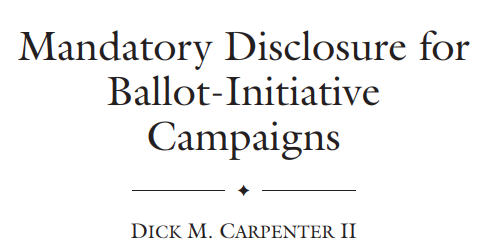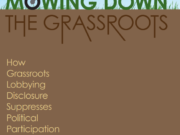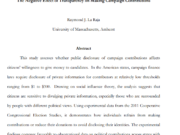The most common approach to disclosure in American politics is simply and aptly described as “more is better.” Disclosure is often championed as a low-cost means of combating the allegedly corrosive effects of money in politics by providing information to the public about the source of funding and expenditures made by groups advocating for the election or defeat of a candidate or ballot issue. Disclosure places costly burdens on political speakers, and may chill speech and association if citizens choose not to engage in politics out of fear of accidentally violating the law, making it essential that disclosure laws be well-tailored to meet the state’s interest without overburdening the ability of citizens to organize and speak freely on election issues.
In this article, Associate Professor of Educational Leadership at the University of Colorado, Colorado Springs, and Director of Strategic Research at the Institute for Justice, Dick M. Carpenter II, tests the assumption that disclosure improves democracy by studying voter responses to telephone polling questions gauging: 1) voters’ level of support for disclosure, 2) voters’ willingness to contribute to the support or opposition of a ballot issue in the face of disclosure requirements, 3) voters’ knowledge of disclosure laws, and 4) voters’ access to, and use of, disclosure information. Carpenter then considers each of these variables within the context of specific ballot issue questions.
The responses show how far rhetoric is removed from reality in discussions of disclosure. 82% of respondents agreed or strongly agreed with the statement “The government should require that the identities of those who contribute to ballot issue campaigns should be available to the public,” yet only 40% agreed or strongly agreed with the statement “If I contribute money to a ballot issue campaign, I believe my name, address, and contribution amount should be posted on the Internet by the state.” In basic terms, that means 4 out of 5 people support disclosure for others, but only 2 out of 5 support disclosure for themselves.
Over 70% of respondents claimed that disclosure information would influence their position on a ballot issue, but only 38% reported that they usually look up the contributors backing ballot issues prior to voting, again showing a major disconnect between what information people claim to want disclosed and what information they actually seek out and use.
In addition to showing that citizens place relatively low value on disclosure in practice, Carpenter’s research finds strong evidence of a “chilling effect” on free speech and association caused by disclosure laws. Respondents who indicated they would think twice about contributing in the face of disclosure requirements were prompted to explain why disclosure would cause them to reconsider contributing, and over half of respondents indicated the reason was a desire to keep their contribution anonymous. Other common answers were a fear of harassment, identity theft, or problems at work if their employer learned of their political views.
Carpenter’s article has two key findings. One is that the strong public support for disclosure often cited in the media shrinks tremendously when respondents are asked to consider their own political activity. ‘Disclosure’ in the abstract may poll very well, but when asked if their own contributions should be subject to disclosure, a majority of Americans say ‘no.’ Carpenter’s other important finding is that there is evidence supporting claims that disclosure creates a significant chilling effect on speech and association by discouraging citizens from making contributions. Both findings are bad news for supporters of greater disclosure or political naming-and-shaming. They suggest that disclosure laws bring less benefit to the public than previously thought, at a greater cost than is commonly recognized.














